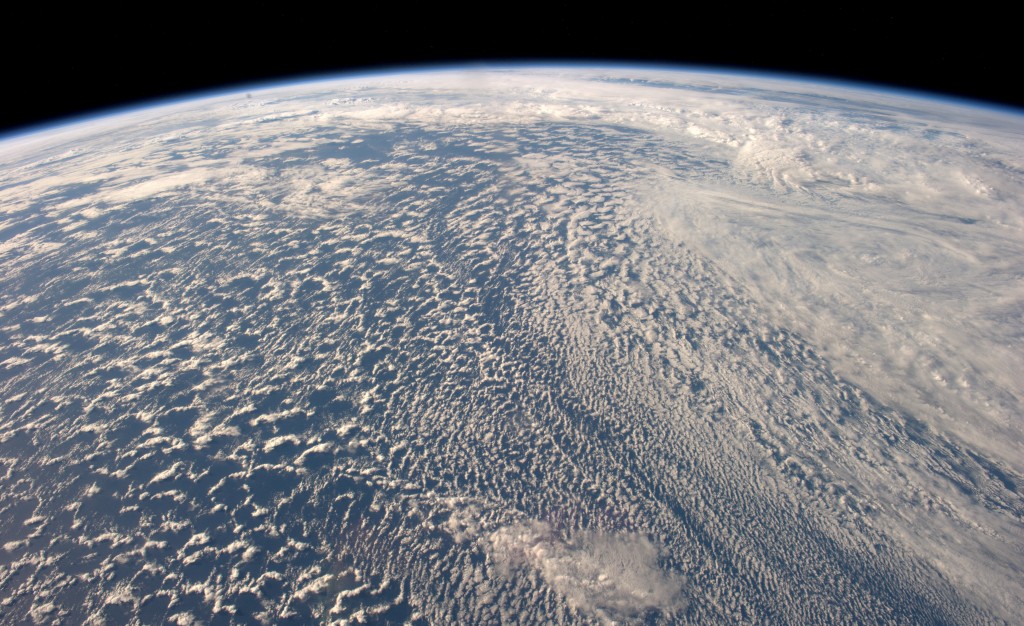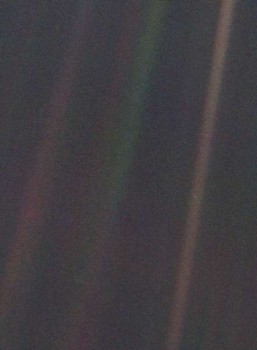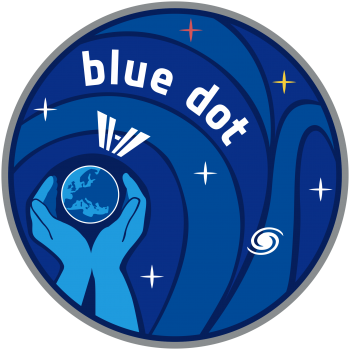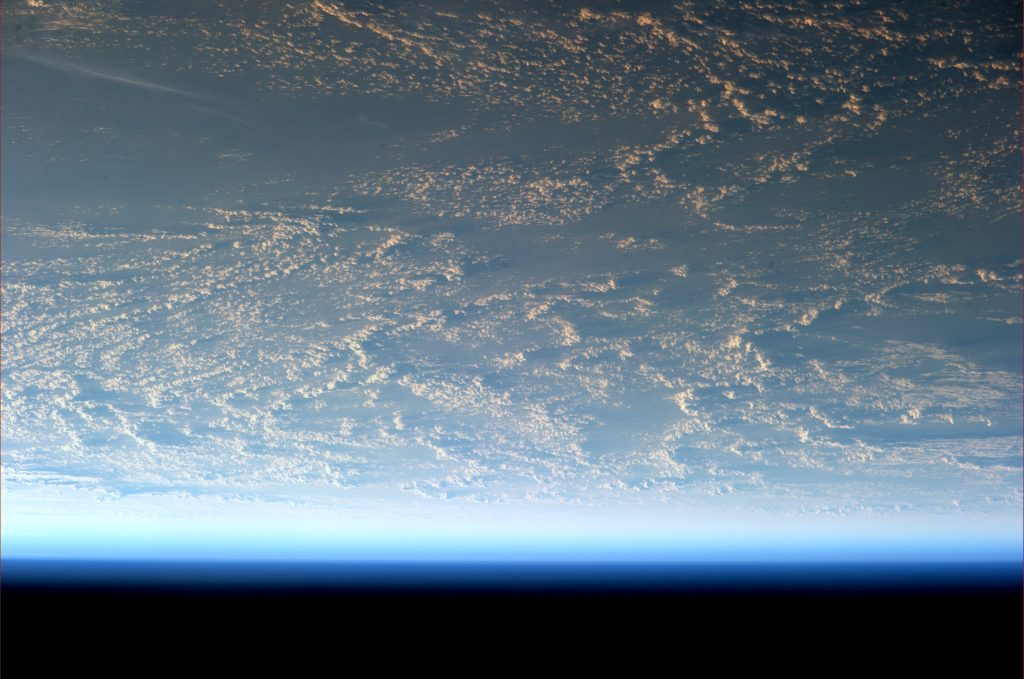Can you imagine all countries and continents you have ever seen, every human being that has ever lived, every living thing that has ever existed on our planet, everything that has ever happened, even our planet itself, being reduced to just one tiny dot? I could not. And yet it happened.
Back in 1990, the astronomer Carl Sagan convinced NASA to turn one of the cameras of the Voyager spacecraft around to take one last look at the planets as it left the Solar System. The image produced was as spectacularly simple as it was impressive. Viewed from a distance of 6.5 billion kilometres, the Solar System was a black space – one in which the planets became mere tiny dots on a screen.
A single pixel was blue.
Astronauts returning from trips to space report how vulnerable our planet appears from outside. The Apollo missions taught us that our Earth is but a piece of rock surrounded by a wafer-thin atmosphere, travelling along a predetermined orbit through a black, empty and hostile universe. Or, as Buckminster Fuller once put it, Spaceship Earth circles the Sun once a year with all of us on board. It is our only ship. If we disturb the fragile life support system on board this spaceship, we will not survive.
When we stand on Earth’s surface, the resources that surround us seem endless. When we travel in an aircraft, we are already above two thirds of Earth’s atmospheric mass. If compressed to the density of water, the atmosphere would have a thickness of just 10 metres. When launching on a rocket, we leave its outer reaches in eight minutes. And yet it is the one thing protecting us from noxious cosmic radiation.
When confronted with a problem, it is often wise to take a step back and view the situation from the outside. And it is precisely this perspective that I hope to bring back from the Blue Dot mission. I want to communicate what it feels like, as a human being, to view our planet from outside, and how valuable this perspective is.
I am convinced that the time will come when each of us will have the opportunity – once in our lives – to see the planet from this perspective. And I am certain it will change humankind for the better. After all, it is up to each and every one of us to decide whether we wish to fly as a passenger or as a crewmember on Spaceship Earth.








Discussion: 12 comments
Hey Alex, I really wish purple would be less greedy and profit-focused. Then, perhaps, they would start to look around and care more about their surroundings and the planet, in general. As it is now, profit making and richness are the measures of mankind and that’s what matters to most of the people. Unfortunately, the only chance I see to change that would be if everyone in the world would have their basic needs covered, i.e., food and housing, then things could change. I hope to see it happening. Greetings from the BlueDot, Ralf
Lieber Alexander,
Vielen Dank für diesen sehr schönen und nachdenklich machenden Blogeintrag, und für all die wunderbaren Bilder und Gedanken aus dem All! Ich fliege jeden Tag ein bisschen mit.
Viele Grüsse aus dem wilden und kleinen Norwegen
Ines
Hi Alexander, erst mal lieben lieben Dank für die wunderschönen Aufnahmen im Internet und TV. Das hört sich wahrscheinlich verrückt an, aber ich kann es echt nachvollziehen was du da schreibst, obwohl ich nur einen TANDEMSPRUNG aus 4.000 Meter gemacht habe. (Ich werde meine Lizenz jetzt machen ;-P). Ich glaube aber das dieses Privileg, also Weltraumreisen, Leute wie du vorbehalten bleiben sollte. Wenn der mensch noch nicht mal sieht wie schön seine Welt ist, wenn er/sie z.B. am Strand steht und einfach die nächste Coladose ins Meer reinwirft, dann wird dieser Mensch auch im Weltall die Augen nicht aufkriegen,…..leider..
Hello Alex, let me introduce myself, I’m a lawyer and I am 43 years old, live in Santa Rosa, Rio Grande do Sul, Brazil and consider you an artist and a poet. The photos you post are magnificent and have many curiosities too to know how your life inside the space station. I wonder if you’re feeling physically the effects of weightlessness. I also saw a video which shows that the sweat and urine is turned into drinking water, I found this very interesting and challenging. Another thing, I speak only in Portuguese and use the http://www.tradukka.com site to translate into English.
How can we help to promote the Blue Dot mission in our schools? Has an awareness committee been established yet?
Was für ein wundervoller Beitrag mit tollen Bildern. Es ist so gut, dass genau dieses Bewusstsein uns wiedereinmal in Erinnerung gebracht wird und dass Alexander diese Mission so leidenschaftlich mit uns teilt. Danke dafür und gerne noch mehr davon! :-)
Olá, Sr. PI, seu texto/testemunho contribui imensamente na reflexão sobre a nossa missão de cuidar deste ponto azul.
Espero que as pessoas entendam essa perspectiva, ah e não é necessário sair do nosso planeta e nem tirar os pés do chão, basta ver, sentir e amar a Vida deste ponto azul.
Thank your for your insightful blogs and sharing your perspective with us. It is always nice to be reminded that we live in ONE planet, and that we really are connected.
Danke für die beeindruckenden Bilder und Berichte!
Einfach wundervoll, diese Blue Dot Mission. Ich hoffe und bete, dass Ihr damit Erfolg haben werdet und die Menscheit auch dadurch langsam darauf kommt, immer nachhaltiger mit unseren Ressourcen umzugehen. Wenn ich mich aber derzeit medial so umsehe, schwinden aber meine Hoffnungen zusehends.
Wunderschöne Worte zu unserem fragilen Planeten, den wir alle viel zu selbstverständlich nehmen…
Lieber Alexander,
Mein Sohn Philipp (5) war schon auf zahlreichen Weltraummissionen mit Dir :) Begeistert schaut er Berichte von Dir, fragt mich Löcher in den Bauch und funktioniert sein Spielzeug zu Rakete, Satelliten und Raumstationen um. Sein größter Wunsch seit 2 Jahren ist es Astronaut zu werden und das ist der einzige Grund weshalb es ihm sinnvoll erscheint ab nächstem Jahr in die Schule zu gehen.
Viele Grüße aus Mannheim (Erde)
Kirsten mit Philipp